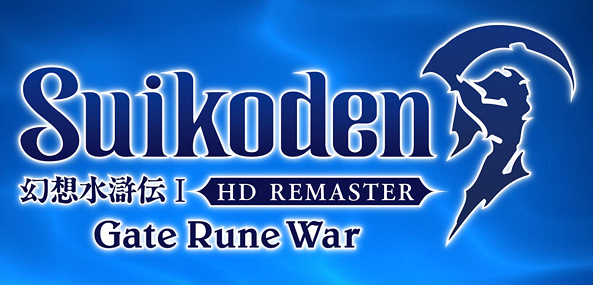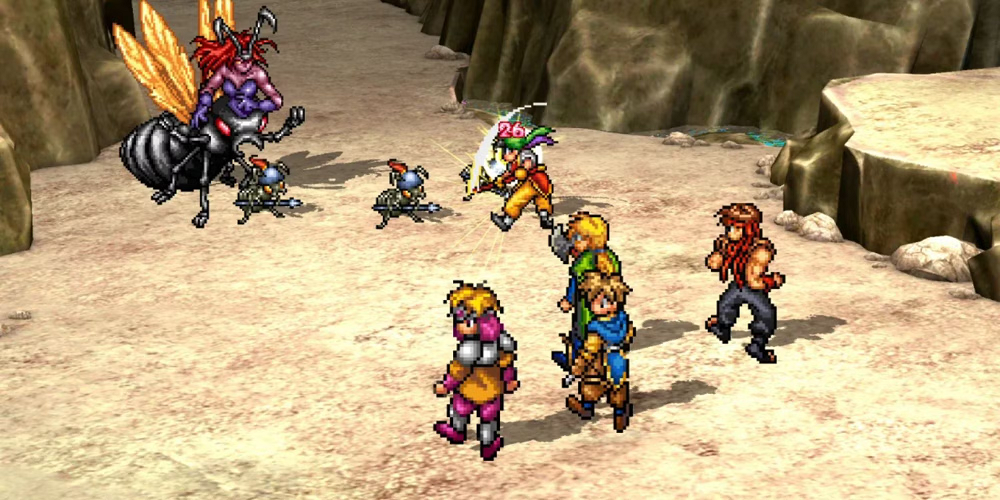GAME CLEAR No. 236 -- Suikoden I HD Remaster: Gate Rune War
video games game clear suikoden konami ps1 ps5 playstationSuikoden I HD Remaster: Gate Rune War (2025, Multiplatform)
Part of compilation: Suikoden I & II HD Remaster: Gate Rune & Dunan Unification Wars (2025, Multiplatform)
Which is a remaster of: Suikoden I & II (2006, PSP)
Which is itself a compilation port of: Suikoden (1995, PS1/Saturn/PC) and Suikoden II (1998, PS1/PC)
Original Developer: Konami Computer Entertainment Tokyo
Original Publisher: Konami
PSP Developer: Konami
PSP Publisher: Konami
HD Developer: Konami
HD Publisher: Konami
Clear Version: PS5
Clear Platform: PS5
Clear Date: 6/22/25

| Why should I care? |
|---|
| A game that imagines the possibility of a successful, grassroots civil uprising against tyranny is refreshing at times like these. |
Crootin'
Suikoden here is another happy case of me procrastinating trying a game long enough for it to get a port or remaster for modern platforms. For all their failings to make any new games, Konami has at least done a decent job of competently rereleasing a number of their classics over the past few years — and Suikoden is certainly a classic. I have my gripes, but overall I consider Suikoden to be a great RPG with fun and creative elements I’ve not seen in its peers (although I admit my sample size is limited).
The game takes its title and loose concept from Water Margin, a classic of Chinese literature (whose title is 水滸伝 in Japanese, romanized as “Suikoden”). It’s the story of 108 outlaws who band together to overthrow the government. Although the characters and world of Suikoden the game are original, its basic plot also involves 108 outlaws (or the “Stars of Destiny” as they are called in the game) creating a Liberation Army to defeat the Barbarossan Empire, which has grown tyrannical in the years leading up to the events of the game.
The (eventual) leader of this army is you, the player character — who also happens to be the son of the Empire’s most esteemed general, Teo McDohl. While pops is off on a mission to the north, the you’ll take on some responsibilities for the empire, which quickly lays bare its corrupt ways. Before long, your childhood best friend is attacked by Windy, the Emperor’s Court Magician, in an attempt to steal the True Rune he bears, which would grant her unspeakable power. He entrusts the rune, called the Soul Eater, to you. For your insubordination in refusing to hand it over to Windy, you are suddenly on the lam from the government your father spent his life serving (and which you and your comrades expected to).
So go the first hour or two of Suikoden. Although you are initially met with mistrust from the existing rebel group for being a McDohl, it is not long before you take the reins of it and begin recruiting new members. This is another of the game’s central mechanics: finding those 108 Stars. They are scattered throughout the world and all have different things to offer the Liberation Army. Some will join naturally through the events of the game’s plot, others require you to seek them out. As you travel from town to town, you must constantly be on the lookout for people who might be amenable to joining your cause. Some will take little convincing, others may demand that you do something for them first. Regardless, the game’s best ending can only be achieved by finding and recruiting them all.
I think this is overall a pretty great system, but I will admit it did lead me to using a guide pretty heavily throughout the game. Some recruits are missable or otherwise difficult to encounter naturally, and I didn’t want to have to replay hours and hours of the game if I accidentally missed one. This took out a bit of the joy of discovery for me, but obviously everyone’s approach to this concern will be different.
Regardless of how you track them down, it’s tough to manage a nomadic army, so you’ve got to set up a headquarters as well. When your ragged band of rebels finds an island cave teeming with beasties, you decide to clear it out and take up residence there yourself. Now you’ve got a little home to run around in! It’s a terrific piece of the game and really helps with the feeling that you’re amassing a true fighting force. It’s also where non-combatant recruits come in: you can recruit shopkeepers, weapon smiths, item appraisers, cartographers, artists, and more to aid in the war effort, and they will set up in little nooks and crannies throughout HQ. By midway through the game, the Liberation Army HQ is as bustling as any town in the game world. Each recruit has something to say or do there, making your efforts to find them feel thoroughly rewarded.

At its heart, though, Suikoden is a turn-based RPG, not a clubhouse simulator. You will spend the majority of your time engaging in turn-based battles and dungeon crawling, and the good news is the battles are good fun too. I will say the battles can be a bit easy if you have experience with this sort of game, so I’d recommend playing on hard if you do. Nevertheless, you have great freedom to customize your party as you like given the staggering number of playable allies you can recruit. You can organize your battle party of six into two ranks, which matters since each character has a different attack range. This brings some light additional strategy into the mix, but generally it is a standard RPG battle system. You can order each character to do a standard attack, a magic attack, or potentially a special attack based on whatever rune they may have equipped. Certain pairs or groups of characters can also perform powerful “unite” attacks based on their affinity for each other. It’s fun to experiment with these options, and the game frequently forces required party members on you (for plot reasons), so you’ll have to whether you like it or not.
Breaking up this action is a series of military battles fought on a grander scale. The Empire’s generals operate in its various corners, and conflict naturally arises as the Liberation Army performs its titular job. These battles are done with a simple rock-paper-scissors system, which is a functional enough mini-game to advance the plot. They generally culminate in a duel between the general and an aggrieved member of the Liberation Army, and these one-on-one battles also use an RPS system. I can understand wanting more from these modes, but I think they are reasonably functional and elegant for what they need to accomplish.
And that is more or less the gameplay loop of Suikoden. Recruit folks to grow your ranks and improve your HQ; go to towns to see how the Empire is ruining the people’s lives; fight the empire about it. While much of the action is pretty standard, the recruitment elements and sheer number of allies you can find and use make this game stand out a bit from others I’ve played. It’s exciting to know there’s a slew of sequels to look forward to that follow a similar formula.
I also appreciate the relative groundedness of the game’s plot. While many RPGs feature the classic “kill god” type storyline, Suikoden tells a more human and realistic story. Yes, there are fantasy elements like dragons, magic, and things of that nature, but it doesn’t get crazy with the supernatural or surreal like Final Fantasy or Persona. I love Sephiroth as much as the next guy, but I enjoy games that take Suikoden’s approach as well. It also doesn’t demand as much of your time as some of its peers. I cruised through it in about 17 hours. Not bad at all.
If I was let down by anything in this game, it sadly is probably the music. I typically associate Japanese RPGs with outstanding soundtracks, and Suikoden’s certainly didn’t hit like those. It’s by no means bad, but it’s not memorable either.
I absolutely don’t want to end on a sour note, though. Suikoden rules. Here’s hoping more of its sequels find their way to modern platforms.